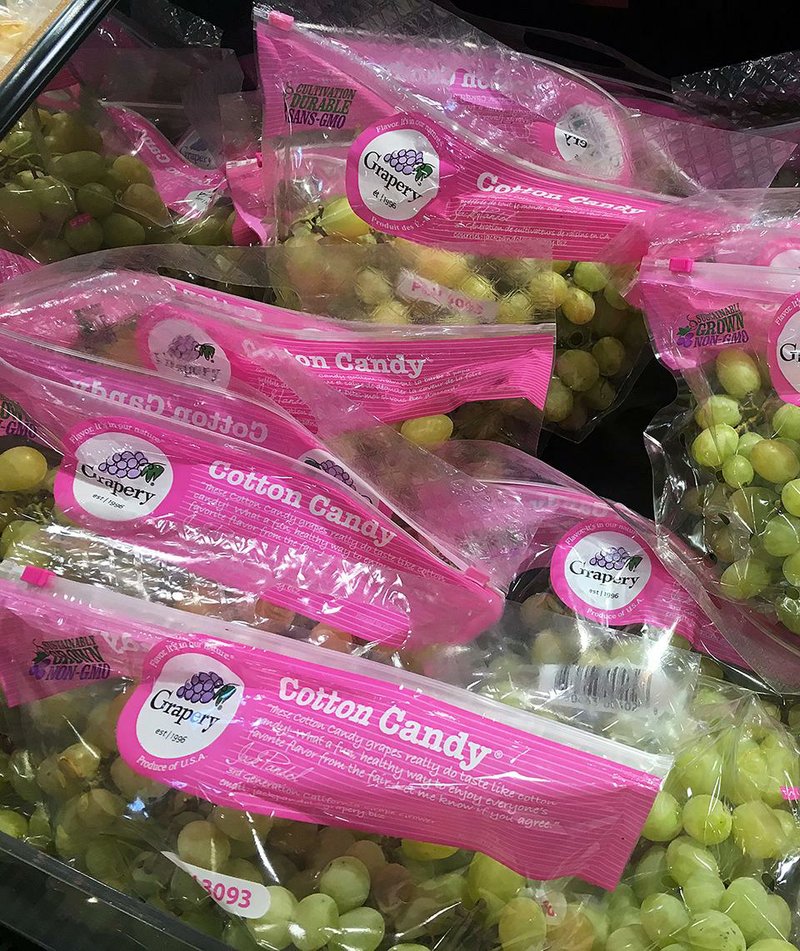The Cotton Candy grape -- a fruit anomaly that began production in California -- has lit up faces in recent years for its distinctly sweet flavor. That is, if shoppers can get their hands on them.
"I've seen people ask for Cotton Candy grapes, and if we don't have them, they'll walk right out the door," said Matt Fowler, co-manager at Whole Foods in Fayetteville.
The grape's short season and high demand have made it one of the most sought-after fruits in grocery stores, but few actually know about its Ozark roots.
Sold as a solution for picky eaters and a somewhat stale grape market, the unique fruit is one of many collaborative projects aimed at making fruit exciting again for consumers, said John Clark, a horticulture professor and director of the fruit breeding program within the University of Arkansas System Division of Agriculture.
Clark and founder of the breeding program, Jim Moore, had developed different fruit selections for decades, mostly ones that were disease-resistant and could survive Arkansas' varied climate.
"If it can survive here, it can survive anywhere," Clark said, jokingly.
From their research, Clark and Moore co-invented the father parent of what is today sold across the world in a brief window from the end of August to late September.
The final Cotton Candy variety didn't happen overnight though. Building on Moore's research that began in 1964, the final product has been roughly 50 years in the making, Clark said.
In 2001, David Cain, a world-renowned fruit geneticist, worked with International Fruit Genetics in California to begin developing different types of table grapes. Cain led a private table grape breeding effort 15 years prior, but didn't have enough genetic materials to create something uncommon.
Cain was familiar with the fruit breeding program in Arkansas, Clark said.
"When David approached me, I wasn't sure what to say," he said. "I felt I needed innovative ways to support the Arkansas breeding effort and this looked like one of them."
In 2002, Clark and Cain made final agreements and the first Arkansas breeding materials were sent to California, including Cotton Candy's father.
Today, International Fruit Genetics have hybridized many of their best selections with those from the University of Arkansas, according to the California-based private fruit breeder.
"This approach is producing new seedless selections with the large size and crunchy texture from our selections, combined with a range of delicious exotic flavors from the University material," International Fruit Genetics said.
After years of plant breeding, the Cotton Candy variety made its debut in 2011 at limited store locations. Since then, growers have farmed more acres of Cotton Candy in California, and started growing it in Peru, Chile, Brazil and Mexico to meet market demand. Other California grapes with Arkansas origins have also been popping in stores along the West Coast.
Jack Pandol, grower and owner of the Grapery, said market research has shown favorable consumer interest in the exotic fruits.
"Candy Snaps and Candy Dreams are varieties with Arkansas blood that are just coming to the market in small quantities," Pandol said in a statement. "Candy Snaps has strawberry-like flavors and Candy Dreams has grape popsicle/bubble gum flavors that consumers have responded to very well."
With help from Clark and Moore's research, people around the world are tasting the fruit of the University of Arkansas collaboration and royalties from grape sales are being funneled back into the fruit breeding program for further research.
Cotton Candy grapes are made available at Whole Foods for $4.99 per pound and Sam's Club for about $3.33 per pound; but shoppers need to act fast.
Fowler, who previously worked at the Whole Foods in Little Rock and a few Sam's Club stores, has seen the same trend with the carnival-like grape.
"The biggest issue we have is maintaining supply," Fowler said.
SundayMonday Business on 09/10/2017

